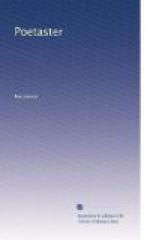To Jonson have also been attributed additions to Kyd’s Jeronymo, and collaboration in The Widow with Fletcher and Middleton, and in the Bloody Brother with Fletcher.
Poems. —
Epigrams, The Forrest, Underwoods,
published in fols., 1616,
1640;
Selections: Execration
against Vulcan, and Epigrams, 1640;
G. Hor. Flaccus his art
of Poetry, Englished by Ben Jonson,
1640;
Leges Convivialis, fol., 1692.
Other minor poems first appeared
in Gifford’s edition of Works.
Prose. —
Timber, or Discoveries made upon
Men and Matter, fol., 1641;
The English Grammar, made by Ben
Jonson for the benefit of
Strangers, fol.,
1640.
Masques and Entertainments were published in the early folios.
Works. —
Fol., 1616, vol. 2, 1640 (1631-41);
fol., 1692, 1716-19, 1729;
edited by
P. Whalley, 7 vols., 1756;
by Gifford
(with Memoir), 9 vols., 1816, 1846;
re-edited
by F. Cunningham, 3 vols., 1871;
in
9 vols., 1875;
by Barry Cornwall (with Memoir),
1838;
by B. Nicholson (Mermaid Series),
with Introduction
by C. H. Herford, 1893, etc.;
Nine Plays, 1904; ed.
H. C. Hart (Standard Library), 1906, etc;
Plays and Poems, with Introduction
by H. Morley (Universal
Library),
1885;
Plays (7) and Poems (Newnes),
1905;
Poems, with Memoir by H. Bennett
(Carlton Classics), 1907;
Masques and Entertainments,
ed. by H. Morley, 1890.
Selections. —
J. A. Symonds, with Biographical
and Critical Essay,
(Canterbury
Poets), 1886;
Grosart, Brave Translunary
Things, 1895;
Arber, Jonson Anthology, 1901;
Underwoods, Cambridge University
Press, 1905;
Lyrics (Jonson, Beaumont and
Fletcher), the Chap Books,
No. 4, 1906;
Songs (from Plays, Masques,
etc.), with earliest known setting,
Eragny Press,
1906.
Life. —
See Memoirs affixed to Works;
J. A. Symonds (English Worthies),
1886;
Notes of Ben Jonson Conversations
with Drummond of Hawthornden;
Shakespeare
Society, 1842;
ed. with Introduction and Notes
by P. Sidney, 1906;
Swinburne, A Study of Ben Jonson,
1889.
---------------------------------------------------- re>The poetaster: Or, his
arraignmentTo the virtuous, and my worthy friend
Mr. Richard MartinSir,—A thankful man owes a courtesy ever; the unthankful but when he needs it. To make mine own mark appear, and shew by which of these seals I am known, I send you this piece of what may live of mine; for whose innocence, as for the author’s, you were once a noble and timely undertaker, to the greatest justice of this kingdom. Enjoy now the delight of your goodness, which is, to see that prosper you preserved, and posterity to owe the reading of that, without offence, to your name, which so much ignorance and malice of the times then conspired to have supprest.
Your true lover, Ben Jonson.




